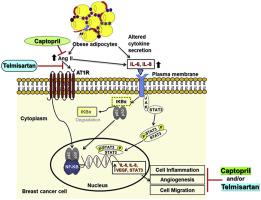Experimental Cell Research ( IF 3.7 ) Pub Date : 2020-06-03 , DOI: 10.1016/j.yexcr.2020.112114 Fahmida Rasha 1 , Latha Ramalingam 1 , Kalhara Menikdiwela 1 , Arelys Hernandez 2 , Hanna Moussa 3 , Lauren Gollahon 4 , Rakhshanda Layeequr Rahman 5 , Naima Moustaid-Moussa 1

|
Obesity is a significant breast cancer (BC) risk factor and is associated with 20–40% increased risk in obese post-menopausal women compared to their lean counterparts. Several obesity-related metabolic dysregulations have been linked to BC risk, including overactivation of the renin-angiotensin system (RAS). Currently, RAS inhibitors including angiotensin converting enzyme inhibitor (ACEi) and AT1 receptor blockers (ARBs), are used as safe and effective anti-hypertensive therapies in BC patients. However, it is uncertain how inhibition of RAS in adipose tissue impacts obesity-BC crosstalk. We hypothesized that adipose RAS inhibition will reduce BC cell motility and inflammation. We determined (1) the direct effects of Ang II, ACEi (captopril; Cap) or ARB (telmisartan; Tel) on receptor positive MCF-7 and receptor triple negative MDA-MB-231 cells; and (2) the effects of conditioned media (CM) from human mesenchymal stem cells differentiated into adipocytes, which were pretreated with RAS inhibitors, on BC cells. We demonstrated that direct treatments of BC cells with Ang II, Cap or Tel did not alter inflammatory cytokines in either BC cell line. However, CM from Ang II-pretreated adipocytes significantly increased secretion of pro-inflammatory markers at protein level. RAS inhibitors reduced their secretion in MDA-MB-231, but not in MCF-7 cells. Additionally, CM from adipocytes treated with RAS inhibitors significantly reduced markers of inflammation, fat synthesis, and angiogenesis in both BC cell lines. Furthermore, CM from ACEi pretreated adipocytes reduced cell motility in both BC cell lines. Findings from our study indicate an important role of adipose RAS inhibition in adipocyte and BC cell crosstalk.
中文翻译:

肾素血管紧张素系统抑制作用减弱了脂肪细胞与乳腺癌细胞的相互作用。
肥胖是重要的乳腺癌(BC)危险因素,与绝经后的肥胖女性相比,肥胖与绝经后肥胖的风险增加20-40%有关。与肥胖相关的几种代谢异常与BC风险有关,包括肾素-血管紧张素系统(RAS)过度活化。当前,包括血管紧张素转化酶抑制剂(ACEi)和AT1受体阻滞剂(ARB)在内的RAS抑制剂在BC患者中被用作安全有效的抗高血压疗法。然而,尚不确定脂肪组织中RAS的抑制如何影响肥胖-BC串扰。我们假设脂肪RAS抑制将减少BC细胞的运动性和炎症。我们确定(1)Ang II,ACEi(卡托普利; Cap)或ARB(替米沙坦; Tel)对受体阳性MCF-7和受体三阴性MDA-MB-231细胞的直接作用;(2)来自人间充质干细胞的条件培养基(CM)分化为脂肪细胞(经RAS抑制剂预处理)对BC细胞的影响。我们证明用Ang II,Cap或Tel直接治疗BC细胞不会改变任一BC细胞系中的炎性细胞因子。然而,来自Ang II预处理的脂肪细胞的CM在蛋白质水平上显着增加了促炎标记的分泌。RAS抑制剂减少了它们在MDA-MB-231中的分泌,但没有减少MCF-7细胞中的分泌。此外,用RAS抑制剂处理过的脂肪细胞中的CM可显着减少两种BC细胞系中炎症,脂肪合成和血管生成的标志物。此外,来自ACEi预处理的脂肪细胞的CM降低了两种BC细胞系的细胞运动性。



























 京公网安备 11010802027423号
京公网安备 11010802027423号